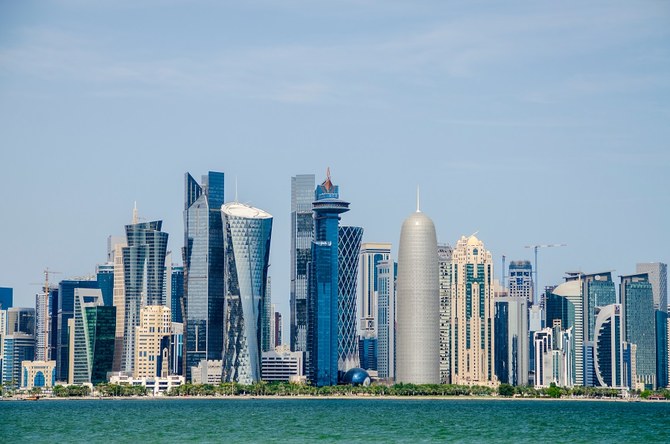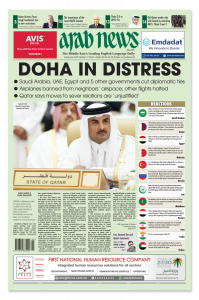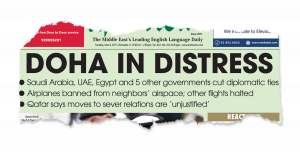- ARAB NEWS
- 11 Jul 2025

Mohammed Al-Sulami
Summary:
On June 5, 2017, Saudi Arabia, Egypt, the UAE and Bahrain cut diplomatic ties with Qatar, closing borders and airspace, and imposing an economic blockade that still remains in place.
Saudi Arabia said at the time that the decision was based on “Qatar’s embrace of various terrorist and sectarian groups aimed at destabilizing the region, including the Muslim Brotherhood, Al-Qaeda, Daesh and groups supported by Iran,” as reported in Arab News.
The four states, and others that soon joined the boycott, had spent years trying to persuade Doha to stop supporting terrorist groups and interfering in the internal affairs of other countries in the region, including its GCC allies.
Qatar’s alignment with Iran, a destabilizing and threatening influence in the region, was of special concern to states wary of Tehran’s ambitions in the Gulf.
As a reporter for Arab News, I was surprised when my request for an exclusive interview with Qatar’s foreign minister on the sidelines of the 17th Doha Forum in May 2017 was swiftly granted.
It seemed to signal that Sheikh Mohammed bin Abdulrahman Al-Thani had a message he wanted to convey ahead of the Riyadh Summit, due to be held a week later in the presence of the leaders of other Gulf and Arab countries and, on his first overseas trip, US President Donald Trump.
After I sat down with Al-Thani, the first topic on the agenda was the thorny issue of Qatar’s support for the Muslim Brotherhood, which some Gulf states and other Arab countries consider a terrorist organization.
I was surprised by Al-Thani’s response, summed up in the front-page headline in Arab News on May 17: “We do not, will not and have not supported the Muslim Brotherhood.”
Our conversation moved on to the other big issue increasingly alienating Qatar from the rest of the Gulf Cooperation Council (GCC) — the closeness of its relations with Iran. Doha, said Al-Thani, did not enter into direct dialogue with Iran without the GCC. But, he added, Qatar had “responded positively to Iran’s call for dialogue.”
The theme of that year’s Doha Forum was “Development, Stability and the Refugee Crisis.” As we talked in the Sheraton Hotel, Doha, neither I nor, so far as I could tell, Al-Thani knew that just three weeks later Qatar would be plunged into a crisis of its own making.
The news that Saudi Arabia, Egypt, the UAE and Bahrain were cutting diplomatic ties with Qatar and imposing a boycott on the country broke on June 5, 2017, but the origins of the decision could be traced back two decades.
The news that Saudi Arabia, Egypt, the UAE and Bahrain were cutting diplomatic ties with Qatar and imposing a boycott on the country broke on June 5, 2017, but the origins of the decision could be traced back two decades.
Mohammed Al-Sulami
On June 27, 1995, Sheikh Hamad bin Khalifa Al-Thani had seized power in a bloodless coup, deposing his father, Sheikh Khalifa, who had left the country for medical treatment. Under Sheikh Hamad, Qatar began to drift out of alignment with the other GCC states, interfering in their internal affairs, supporting terrorists groups and even broadcasting speeches by Al-Qaeda leader Osama bin Laden on the Al-Jazeera television channel, founded by the state the year after Sheikh Hamad took control.
Just how far Doha had strayed from the GCC’s common values started to become apparent when several terrorists affiliated with Al-Qaeda and holding Qatari passports, were allowed to infiltrate the Kingdom through Qatar. Among them was Abdel Aziz Al-Muqrin, who in 2002 took charge of Al-Qaeda in Saudi Arabia and carried out a series of attacks before he was killed by Saudi security forces in 2004.
Hamad bin Khalifa deposes his father and seizes control of Qatar.

Terrorist Abdel Aziz Al-Muqrin enters Saudi Arabia via Qatar, with a Qatari passport.

Qatar signs the first Riyadh Agreement.

Saudi Arabia, the UAE and Bahrain withdraw their envoys from Qatar, accusing Doha of interfering in other states’ affairs.
Saudi Arabia designates the Muslim Brotherhood as a terror organization. On Nov. 15, the UAE follows suit.

Ambassadors of Saudi Arabia, the UAE and Bahrain return to Doha, and Qatar signs a supplementary agreement.
Arab News publishes an exclusive interview with the Qatari foreign minister, who denies Doha supports the Muslim Brotherhood.
UAE, Saudi Arabia and Egypt block access to Al-Jazeera’s website.
Saudi Arabia, Egypt, the UAE and Bahrain cut diplomatic ties with Qatar.
Saudi-led bloc issues a list of 13 demands with which Qatar must comply if sanctions are to be lifted and relations normalized.
In 2014, two leaked recordings of conversations between Libyan President Muammar Qaddafi, Sheikh Hamad bin Khalifa and former Qatari prime minister Hamad bin Jassim, dating back to 2003, revealed Qatar had been plotting to destabilize and divide Saudi Arabia. On Oct. 25, 2017, Hamad bin Jassim admitted the authenticity of the recordings for the first time.
For years the other Gulf states, and the Kingdom in particular, tried to persuade Qatar to turn from its disruptive path. The attempts continued after Sheikh Hamad stepped down and handed power to his son, Sheikh Tamim, on June 25, 2013, but to no avail.
In November 2013, Doha signed the Riyadh Agreement, brokered between Qatar and Saudi Arabia by Sheikh Sabah Al-Ahmad, the Emir of Kuwait, and designed to improve relations between Gulf states.

At the time, the details of the agreement were secret. But when the document was later leaked, it emerged that Qatar had agreed not to interfere in the internal affairs of the other Gulf states, not to support the Muslim Brotherhood, not to support or finance terrorist organizations and not to support “antagonistic media” — taken to be a reference to Al-Jazeera.
The emir of Qatar had also put his signature to the condition that Qatar’s failure to comply with the provisions of the agreement gave the rest of the GCC countries the right to take whatever measures they deemed appropriate to protect their security and stability.
It quickly became clear that Qatar was failing to abide by the conditions of the Riyadh Agreement and, in March 2014, Saudi Arabia, Bahrain and the UAE withdrew their ambassadors, citing “Doha’s non-compliance with previously agreed decisions.” In November 2014, after the Qatari government declared its commitment to some of the provisions, the return of the envoys was announced and a second agreement signed, but all was still not well.

“Residents of Qatar were seen ‘panic buying’ and some supermarket shelves stood empty after Saudi Arabia, Bahrain, Egypt, the UAE and other countries announced they would withdraw diplomatic staff from the country.”
From a story by Aisha Fareed and Lulwa Shalhoub on Arab News’ front page, June 6, 2017
On June 5, 2017, the Qatar News Agency broadcast a statement by the emir of Qatar, criticizing what he called “anti-Iranian feelings.” Qatari officials quickly disowned the statements, claiming the official news agency’s website had been hacked, but this was the straw that broke the camel’s back.
On the same day Saudi Arabia, Bahrain, the UAE and Egypt cut diplomatic ties with Qatar, blockaded all ports and borders, and listed 13 requirements for the restoration of normal relations.
The most important demands were that Doha should end its support for terrorism and militant groups in Arab countries, cease interfering in the internal affairs of boycotting countries, stop harboring extremists and terrorists in Qatar, and no longer give militants a media platform to attack the four countries.
Qatar’s response? On Aug. 24, 2017, Doha announced that it was restoring full diplomatic relations with Iran and intended to “strengthen bilateral relations with the Islamic Republic of Iran in all fields.”
More than 1,000 days later, the crisis remains unresolved.